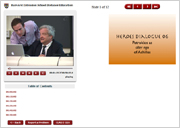Les MOOC (1) vont-ils révolutionner l'enseignement en l'espace de quelques années ? Seront-ils tout au plus un outil d'appoint ? Ou tout cela fera-t-il pschitt ? ("Will it prove an evolutionary cul-de-sac?")
"Il est trop tôt pour le dire. Mais le cours en ligne de Gregory Nagy (2), tel qu'il se présente actuellement, a tout du cours magistral. Peut-on parler de "dynamique de classe" ? L'enseignant parle. Les étudiants écoutent, répondent à des tests d'évaluation, se font sermonner. Certains étudiants font autre chose en même temps (parlent de tout et de rien sur le forum de discussion). Bref, ils ne suivent pas le cours, on pourrait dire qu'ils sont… "déconnectés". Rien de très nouveau donc. Les MOOC seront peut-être utiles quand il s'agira d'acquérir quelques notions de comptabilité ou de se mettre au grec ancien… Mais pourra-t-on jamais "apprendre" l'Iliade de cette façon ?"
Il est de plus en plus facile de se former en ligne et gratuitement. Plus besoin de maîtres. C'est ce que l'on veut nous faire croire. Voici un bel exemple d'hallucination collective : "Entertainment, socialising and information have become screen-shaped. And a cluster of global online learning projects are bringing education into the frame too. Among those attracting attention is the Khan Academy, the US-based free online tuition service, which helps youngsters to catch up on lessons and bright children to stretch themselves further. […] The most recent figures show that the number of people using the website each month has risen threefold in a year to 3.5 million. Shantanu Sinha, Khan Academy president and chief operating officer, says the project is part of a "major transformation" in education. "It's being transformed by accessibility," he says. Anyone with an internet connection can plug into the resources now available online, regardless of where they live. "Cheap tablet computers are going to become ubiquitous. Access to information will be like access to clean running water. A great education will be seen as a basic human necessity." Will online learning reach the places other teaching has missed? Or will it replicate all the inequalities, but in a hi-tech form? The central issue for Shantanu Sinha is giving more people the chance to have access to the core teaching materials they need, in the most useful form, regardless of income or geography. It's an online egalitarianism." (
BBC News, 23/11/11)
1. Massive open online courses.
2. Son cours : "
The Hero in Ancient Greek Civilization." Les trois premières minutes de cette
leçon, qui s'intitule "Patroklos as
alter ego of Achilles", sont assez révélatrices (la position du professeur devant son portable ouvert, l'intervention du technicien, le PowerPoint !). Les temps modernes…
